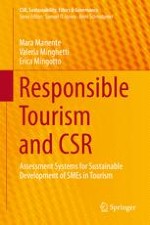What are Responsible Tourism and Corporate Social Responsibility? What is the industry's awareness regarding these concepts? What are the systems and tools currently available on the market that tourism SMEs can use to assess their engagement and the sustainability of their business?
This book is aimed at replying to these questions and offering an innovative contribution to the current debate in the field. After having defined Responsible Tourism and CSR and the environment in which these methodologies develop, the authors present and compare the main European assessment and certification systems, describe their characteristics and functionalities and discuss the relevant issues concerning their application.
Through the AHP model and the selection of a number of relevant case histories, the suitability and efficacy of these systems in monitoring the level of responsibility of tourism SMEs are analyzed and debated. The results obtained contribute to enhance the recognition and diffusion of CSR principles in tourism and to support tourism businesses in choosing the assessment tool that best fits with their characteristics and the nature of their activity. The study also enables students and researchers to build or enhance their knowledge about the main reporting initiatives available in Europe and to assess the potential of the mathematical model applied for this kind of study.
